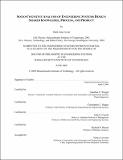Socio-cognitive analysis of engineering systems design : shared knowledge, process, and product
Author(s)
Avnet, Mark Sean
DownloadFull printable version (6.579Mb)
Other Contributors
Massachusetts Institute of Technology. Engineering Systems Division.
Advisor
Annalisa L. Weigel.
Terms of use
Metadata
Show full item recordAbstract
This research is based on the well-known but seldom stated premise that the design of complex engineered systems is done by people -- each with their own knowledge, thoughts, and views about the system being designed. To understand the implications of this social dimension, the Integrated Concurrent Engineering (ICE) environment, a real-world setting for conceptual space mission design, is examined from technical and social perspectives. An integrated analysis demonstrates a relationship among shared knowledge, process, and product. The design process is analyzed using a parameter-based Design Structure Matrix (DSM). This model, consisting of 682 dependencies among 172 parameters, is partitioned (reordered) to reveal a tightly coupled design process. Further analysis shows that making starting assumptions about design budgets leads to a straightforward process of well-defined and sequentially executed design iterations. To analyze the social aspects, a network-based model of shared knowledge is proposed. By quantifying team members' common views of design drivers, a network of shared mental models is built to reveal the structure of shared knowledge at a snapshot in time. A structural comparison of pre-session and post-session networks is used to compute a metric of change in shared knowledge. Based on survey data from 12 design sessions, a correlation is found between change in shared knowledge and each of several system attributes, including technological maturity, development time, mass, and cost. Integrated analysis of design process and shared knowledge yields three interdisciplinary insights. (cont.) First, certain features of the system serve a central role both in the design process and in the development of shared knowledge. Second, change in shared knowledge is related to the design product. Finally, change in shared knowledge and team coordination (agreement between expected and reported interactions) are positively correlated. The thesis contributes to the literature on product development, human factors engineering, and organizational and social psychology. It proposes a rigorous means of incorporating the socio cognitive aspects of design into the practice of systems engineering. Finally, the thesis offers a set of recommendations for the formation and management of ICE design facilities and discusses the applicability of the proposed methodology to the full-scale development of complex engineered systems.
Description
Thesis (Ph. D.)--Massachusetts Institute of Technology, Engineering Systems Division, 2009. This electronic version was submitted by the student author. The certified thesis is available in the Institute Archives and Special Collections. Cataloged from student-submitted PDF version of thesis. Includes bibliographical references (p. 213-222).
Date issued
2009Department
Massachusetts Institute of Technology. Engineering Systems DivisionPublisher
Massachusetts Institute of Technology
Keywords
Engineering Systems Division.